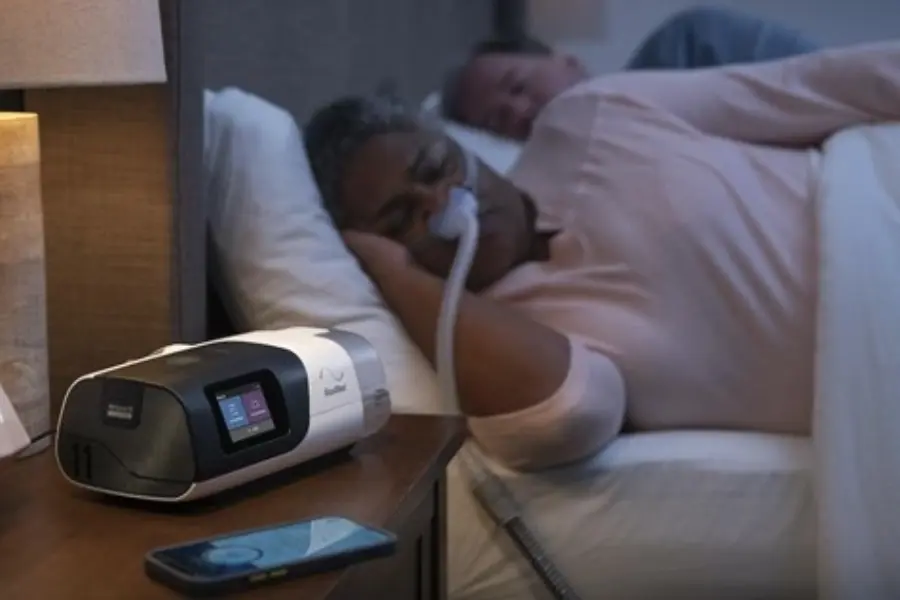If you or someone close to you has been diagnosed with sleep apnea, you may be asking what the distinction between an APAP and CPAP machine is. A potentially dangerous condition called sleep apnea causes the body to periodically cease breathing while you’re asleep.
In adults, sleep apnea affects 2% to 9% of them. While millions of Americans with sleep apnea have received diagnoses and are actively seeking treatment, others may have the condition misdiagnosed or untreated. For treating various forms of sleep apnea, there are primarily three types of PAP therapy:
- Continuous positive airway pressure (CPAP)
- Bilevel positive airway pressure (BiPAP) and
- Automatic positive airway pressure (APAP)
All of these PAP treatment regimens typically include a machine or other apparatus. The patient with sleep apnea wears the mask to receive the air produced by the machine, which is attached to it by a tube.
What is APAP?
APAP stands for “automatic positive airway pressure” and is one of the three basic kinds of PAP treatment. (The other two being CPAP and BiPAP.) The APAP’s capacity to automatically modify its airflow is referred to as “automatic.”
An APAP is a device that treats sleep apnea by pressurising air. Your upper airway doesn’t collapse while you’re sleeping thanks to the air pressure acting as a splint.
The primary distinction between CPAP and APAP devices is that CPAPs have a fixed pressure setting, whereas APAPs automatically adapt to various pressures according to your nighttime needs.
Both APAP and CPAP devices produce pressured air in a constant stream to keep your airway open. This is how their respective air pressure delivery systems work.
People who suffer from sleep apnea may breathe normally all night long because of the steady stream of air, which promotes restful slumber.
The APAP technology continually monitors your breathing resistance on a breath-by-breath basis to determine when to increase pressure during stable upper airway conditions and reduce pressure during airway events like apnea, hypopnea, flow restriction, or snoring.
Unlike CPAP equipment, APAP devices only provide the pressure that is required at any particular time.
The most effective treatment for Obstructive Sleep Apnea is CPAP therapy, which offers a constant, steady flow of air at a fixed pressure. The air pressure at this setting is just what you need to avoid obstructing your airway.
An APAP automatically modifies the pressure it delivers as needed to maintain the lowest pressure necessary to keep your airway open.
A minimum air pressure setting range and a maximum air pressure setting range will be established by your doctor.
The APAP machine then automatically determines the degree of air pressure you require at any given time throughout the night using complex algorithms, and the adjustments are made.
Since an APAP machine’s pressure settings are based on a range, changing them doesn’t require a separate titration study.
People with different breathing patterns benefit from this kind of sleep apnea therapy. Your doctor can reset the device to operate like a CPAP if you don’t respond well to APAP therapy for whatever reason.
Who needs an APAP?
People who do not get the expected outcomes from a CPAP machine or those who have particular problems with the CPAP’s constant pressure level are frequently given APAP devices.
In some situations, such as when sleep apnea is associated with other sleep disorders or when it only manifests when the body is in a particular posture, they could be recommended before CPAP equipment.
APAPs may be more effective for those who frequently have allergies, colds, or other transient airway obstructions since they allow for pressure adjustments as needed and a return to a lower setting once the flare-up has gone.
APAP machines do have various shortcomings that need to be taken into account. They could irritate skin, much like CPAP units, especially if the mask is not fitted properly.
They should not be used by anybody with CSA, chronic heart failure, COPD, obesity hypoventilation syndrome, or obesity hypoventilation syndrome-related sleep apnea.
Reasons to consider APAP
- An APAP adapts to your needs because most people don’t have the same breathing patterns during the whole night.
- To find out which titration therapy works best for you, most APAP machines may easily be switched to CPAP mode.
- An APAP will automatically alter the pressure setting to fit within the range your doctor has established as your health changes, such as weight growth or loss.
- Breathing might be more challenging if you have a cold or allergies, which can cause congestion. Everyone gets colds, so it’s convenient to have a device that can adapt automatically if you’re feeling more congested than normal.
CPAP/APAP: Which is more expensive ?
The price is another thing to think about while deciding between APAP and CPAP. Although APAP devices are generally more expensive than CPAP machines, the long-term cost advantages can more than offset this. Because APAPs aren’t calibrated to a certain pressure like CPAPs are, they also lead to fewer medical visits.
Additionally, if you choose APAP, the enhanced comfort may help you adhere to CPAP better, which might result in fewer follow-up sessions and better insurance reimbursement for your therapy.
The normal price range for a fixed-pressure CPAP is between Rs. 30,000 and 32,000. In contrast, APAP devices cost between 55,000 and 60,000 rupees in India.
The difference might be attributed to the superior technology used by APAPs to monitor your breathing and make appropriate adjustments. Because they find it simpler to adhere to their therapy and obtain a restful night’s sleep, individuals who swear by APAP devices think it to be more than enough to justify the cost.
Overall APAP therapy is undoubtedly a better therapy than fixed pressure CPAP therapy.



![10 Best Bags for Nurses | Personal Recommendation [2023] 4 Best Bags For Nurses Reviews in 2021](https://knowworldnow.com/wp-content/uploads/2022/12/Best-Bags-For-Nurses-Reviews-in-2021.webp)



![F95Zone Games - The Ultimate Guide for 2021 [F95Z Guide] 8 F95Zone Games](https://knowworldnow.com/wp-content/uploads/2021/07/ArTtW5LrK3b-z-0-y-637f48d86203817a9042a857.webp)